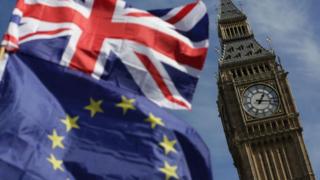
Image copyright
AFP
Northern Ireland is staying in the EU single market for goods at the end of the transition period
The government is to spend up to £355m on a new system for moving goods into Northern Ireland from the rest of the UK.
The system is required as a consequence of the NI part of the Brexit deal.
From 1 January, goods entering NI from GB will need customs declarations.
The Trader Support Service (TSS) will effectively see the government acting as a customs agent on behalf of businesses.
Details will be announced later on Friday by Cabinet Office Minister Michael Gove and NI Secretary Brandon Lewis.
The TSS is due to be up and running in September and will be free to use.
Initially traders will register with the service and receive advice on what Brexit will mean for their business and the next steps they should take.
They will be helped to understand what information they need to collect about the goods they will be importing.
TSS will then use this information to complete import declarations on behalf of importing companies.
It should help to prevent what would have been a significant new administrative burden for many firms.
Mr Lewis said: “It is a unique service that will ensure that businesses of all sizes can have import processes dealt with on their behalf, at no cost.”
However it does not remove all the looming difficulties for GB-NI trade.
For example agri-food products being imported from GB will have to go through an expensive certification process unless a special deal can be reached with the EU.
In its negotiation with EU, the UK government has suggested a ‘trusted trader’ system for supermarkets when moving their products from GB to NI.
Northern Ireland manufacturers import much of their components and raw materials from GB and have welcomed the TSS plan.
The UK government has said there will be no trade border in the Irish Sea but the EU wants goods checks
Stephen Kelly, from Manufacturing NI, said: “This commitment to cover customs costs is a very welcome first step but there is more still to be done.”
He cited the agri-food issue and VAT as areas where more clarity was needed.
“It remains the case that agreement on the future relationship between the UK and EU will remove many potential existential issues so we hope that there is an increased focus on ensuring success in those negotiation for all our sakes.”
It is also still not clear what new processes or barriers could apply to Northern Ireland consumers buying goods online from GB suppliers.
Technology investment
Guidance on this “non-freight” trade will have to be provided in the next few months.
A procurement exercise for the TSS has been launched with the government committing £50m for the establishment and first phase of the service, with the full contract worth up to £200m.
A further £155m will be available for technology investment to digitise and streamline the new processes.
At the end of the Brexit transition period on 31 December, Northern Ireland will continue to follow EU rules on agricultural and manufactured goods, while the rest of the UK will not.
Additionally, the whole of the UK will leave the EU’s customs union but Northern Ireland will continue to enforce the EU’s customs code at its ports.
It is this which will mean new checks and processes for goods moving into Northern Ireland from other parts of the UK.


